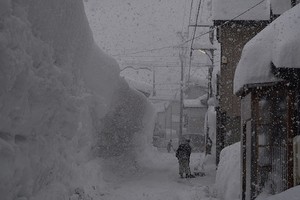By YURI MURAKAMI/ Staff Writer
May 5, 2021 at 07:00 JST
 A woman received many Line messages on conspiracy theories in succession from her mother at the end of February. She needed help, so she posted a photo of a Line message from her mother on Twitter with a comment saying, “I want to die.” The photo was taken in Aichi Prefecture on March 17. (Yuri Murakami)
A woman received many Line messages on conspiracy theories in succession from her mother at the end of February. She needed help, so she posted a photo of a Line message from her mother on Twitter with a comment saying, “I want to die.” The photo was taken in Aichi Prefecture on March 17. (Yuri Murakami)
A woman from Aichi Prefecture in her 20s finally had enough after her mother apparently fell under the spell of QAnon right-wing conspiracy theorists.
She received a message from her mother on the Line app at the end of February that said, “Only Japanese people think that the deep state is just a conspiracy theory.”
She received 14 messages one after another from the morning.
The woman had put up with her mother’s conspiracy messages on Line for half a year, but she reached the limits of her patience.
She posted a photo of Line message from her mother on Twitter with a comment saying, “I want to die.”
Her posting was retweeted more than 10,000 times. A retweet said, “My mother behaves in the same way, and I don’t want to call her.”
Another retweet said, “My husband also started to say such things.”
She discovered that there are many people suffering from a similar problem.
Triggered by the bitter U.S. presidential election and followers of former U.S. President Donald Trump, such conspiracy theories have spread via social media and videos, even in Japan.
There are widening gaps between people who believe in groundless information and their families and people close to them in Japan as well.
An expert warns that social anxiety caused by the COVID-19 pandemic has allowed such conspiracy theories to flourish.
The Aichi woman's mother is believed to have been influenced by videos on QAnon, which she watches for about eight hours in a day.
QAnon is a group of conspiracy theorists who insist that “political and business circles and major media in the United States are controlled by the deep state.”
When the daughter expressed her frustration on Line, she was also met with criticism.
A retweet said, “She is a good mother.” Another retweet said, “Your mother is doing great on collecting information.”
The daughter became angry because she thought “people like these made her mother crazy.”
She said that her mother “is easily persuaded to believe one thing without questioning” from the very beginning.
Her mother stopped watching TV programs or reading newspapers from last summer, and started to watch more videos slandering South Korea and China.
“China will take over Japan,” she said.
Her mother also said of the U.S. presidential election that “China was manipulating it behind the scenes, and evil organizations in every country are responsible for the result.”
When the daughter, who was living with her boyfriend, complained that she had to spend much money on their food, her mother replied, “Trump will transfer 600 million yen ($5.5 million) to each person’s bank account.”
The daughter was considering marrying her boyfriend, but they could not introduce their families to one another.
Her mother’s one-sided Line messages worsened the daughter's health, making her vomit repeatedly.
In January, QAnon followers and pro-Trump supporters stormed the U.S. Capitol in Washington, D.C.
Fujio Toriumi, an associate professor of computational social science in the School of Engineering at the University of Tokyo, analyzed Twitter messages in January.
He said that the number of postings related to the attack on Capitol Hill, including retweets, reached about 3.3 million in Japan. Among these, a posting of a conspiracy theory was retweeted slightly less than 10,000 times.
“Even in Japan, more postings on conspiracy theories by Trump supporters are spreading,” he said.
At the beginning of February, the daughter angrily told her mother, “You are killing me.”
But her mother said, “Wait until March 4,” and seemed to think that Trump would regain the presidency officially on that date.
On March 5, she said to her mother on the Line app, “It was a lie, wasn’t it?”
Her mother replied, “It didn't come to the surface because the deep state is so strong.”
She lost all remaining hope for her mother, who refused to change her beliefs.
“You are harming my marriage plans, so I want to cut off our relationship until Trump really becomes the president again,” she told her mother on the Line app.
After that last message was sent, she blocked her mother on Line and will not take her calls.
Her grandmother, who is being cared for by her mother, called her granddaughter in a depressed tone of voice.
“I am tired because my daughter became like this,” she said. “I’d rather die.”
In recent years, more people started to believe in groundless claims such as conspiracy theories.
Mafumi Usui, a professor of social psychology at the graduate school of Niigata Seiryo University, said, “If you one-sidedly deny things that someone totally believes in, there will be an adverse effect.”
He said that communication and relationships should be maintained, and people should ask questions about things their family members or friends strongly believe in a way of “thinking together.”
Asking questions on what they believe and making them feel simple doubts could help get them out of their fixed beliefs, he said.
“It is easier for people with more anxiety to be persuaded,” he said. “As the COVID-19 pandemic causes more anxiety in society, more people tend to believe in conspiracy theories and cults.”




















A peek through the music industry’s curtain at the producers who harnessed social media to help their idols go global.
A series based on diplomatic documents declassified by Japan’s Foreign Ministry
Here is a collection of first-hand accounts by “hibakusha” atomic bomb survivors.
Cooking experts, chefs and others involved in the field of food introduce their special recipes intertwined with their paths in life.
A series about Japanese-Americans and their memories of World War II